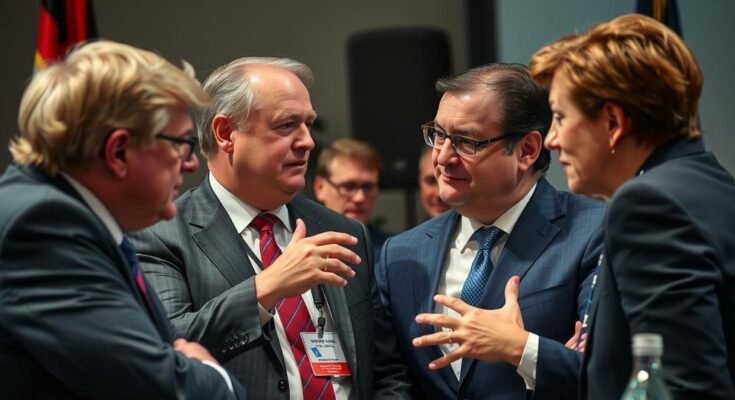Germany faces a political crisis and economic woes as Chancellor Olaf Scholz’s coalition government collapses, leading to early elections. The Bundestag debate revealed deep divisions and a deterioration of debate decorum. Rising far-right and far-left factions threaten the traditional party system, prompting urgent calls for unity among German leaders amid external pressures, including the implications of U.S. politics and the war in Ukraine.
The recent Bundestag debate characterized by anger and personal attacks signified a pivotal moment for Germany, marking the end of Chancellor Olaf Scholz’s coalition government amid severe economic crises and political turmoil. Scholz’s approach to his coalition partners and the harsh rhetoric exchanged have underscored the current strain on German democracy. With early elections slated for February 23, political dynamics are shifting rapidly, as both extreme left and right parties gain traction, threatening the established political landscape. Amid economic challenges, especially in the automotive sector, the political landscape in Germany is increasingly volatile as it faces external pressures from the United States and the ongoing ramifications of the Ukrainian conflict. As Germany prepares for elections, the necessity for unity and constructive dialogue among its leaders becomes ever more pressing, potentially reshaping the future of European politics.
The article discusses the current state of German politics, particularly focusing on the loss of decorum during the Bundestag debate where Chancellor Olaf Scholz was unable to secure the confidence of the parliament, culminating in an impending snap election. The German economy is under duress primarily due to high energy prices and significant political changes as far-right and far-left factions gain ground. The situation in Ukraine adds additional stress to Germany’s political landscape and its role in European politics. This context is essential for understanding the implications of the conflicting political discourses and Germany’s evolving relationship with its European neighbors and the United States.
In conclusion, the unfolding political crisis in Germany highlights severe divisions within the political system, exacerbated by economic challenges and global uncertainties. The immediate future necessitates a re-examination of party strategies and coalition dynamics, as the nation prepares for a pivotal election that will not only reflect on Scholz’s coalition but also constitute a broader referendum on Germany’s democratic values and political structure. The urgency for cooperation among political leaders is paramount to navigate Germany through these tumultuous times and ensure stable governance.
Original Source: www.theguardian.com




